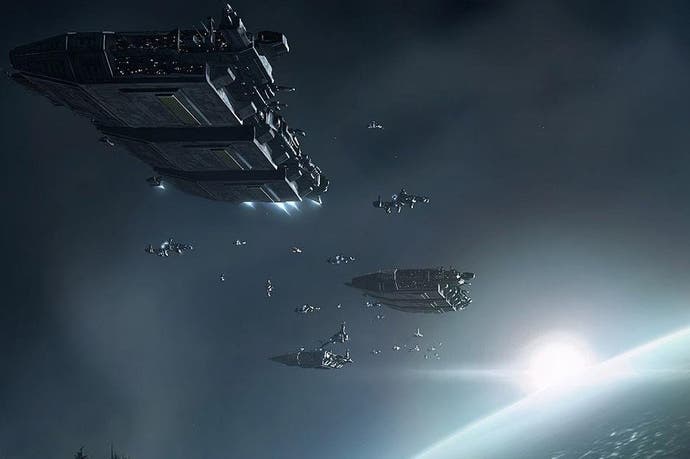Meet the Eve Online creator who CCP left behind
First exit from New Eden.
Thorolfur Beck has enjoyed - or perhaps we should say endured - an intriguing career trajectory. He's been a global ambassador for kids TV phenomenon LazyTown, laboured on a Reykjavik building site, produced Iceland's 2006 Eurovision Song Contest entry and spent six months working in a psychiatric hospital. We should add that all these disparate entries on his CV come after his five-year stint as Eve Online's very first lead designer.
Even if you've been playing Eve since the very beginning, you likely won't have heard of Beck. There's no mention of him on the CCP website, nor in the in-game credits. He's never been wheeled out on stage at Fanfest, in spite of his verbose enthusiasm for single-sharded universes, harsh PVP combat or any other feature that the long-running sci-fi sandbox has singularly championed. He wasn't even invited to attend CCP's 10th birthday celebrations, which seems a little petty given his not-insignificant contribution to the success of the company.
In CCP's defence, Beck did leave just prior to Eve's release and therefore long before the annual Fanfest became a fixture on the Eve calendar. He was also, by his own admission, a trifle unpleasant to be around for much of his CCP career.
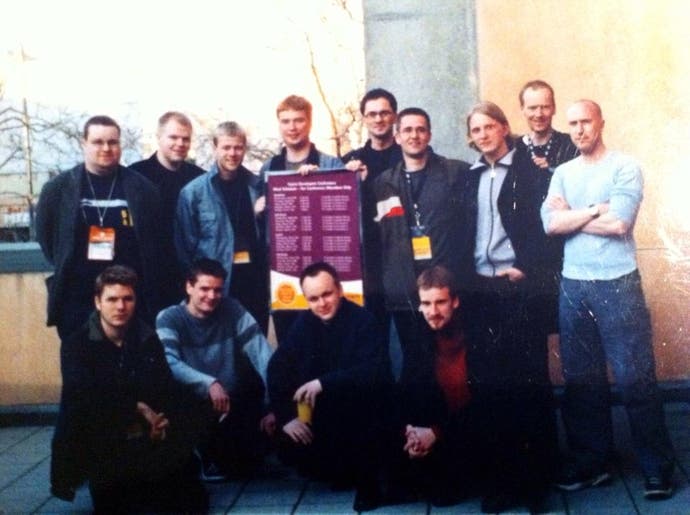
Even so, you'd think as one of Eve's creators and, perhaps more crucially, the founder, manager and very first chairman of CCP, he'd receive a little more recognition for his efforts. "I'm CCP's dirty little secret," he proclaims with impish affection. "But I'm totally OK with that."
It's 11pm in the Icelandic capital and, being so close to the land of the midnight sun as to be within it, daylight lingers long on the horizon as Beck prepares to tell his story. As if on cue his four-year-old daughter crashes about in a back room, unwilling or unable to sleep. Beck disappears momentarily to find another DVD to occupy her before returning to a wandering chronology that he's never particularly felt the need to comply with or challenge, let alone recount.
"I'm talking about things I've not talked about for 10 years," he says after a distracted pause, before chuckling, "It's important for me not to sound like more of an asshole than I am."
Beck doesn't seem like an asshole. While prone to distraction, he's remarkably frank, optimistic and willing to talk at considerable length. Evidently, though, he was an asshole, consistently so, otherwise he wouldn't have been "forcibly ejected" from the company he created and his contribution to Eve effectively wiped from the history books. "Sadly enough, my mere presence seems to bother some people," he says matter-of-factly, refusing to be drawn on who those people might be. "It's obvious to everyone that there's a blind spot somewhere."
Although unconcerned that he's not credited for creating Eve, he would like official recognition that he at least co-created the idea of Eve. "The story is almost that the game came about in a meeting between a lot of people," he says. "That's ridiculous. Eve came about from a childhood fantasy. It wasn't all mine, but it certainly wasn't the fruit of some brainstorming."
For Beck the Eve story began in 1985, after he played Elite on his cousin Benni's Commodore 64. Being the younger of the two and ill-equipped to play the game alone, the 11-year-old Beck was relegated to the position of co-pilot, locking missiles and activating counter-measures while Benni wheeled their Cobra Mk 3 around the game's 8-bit stars.
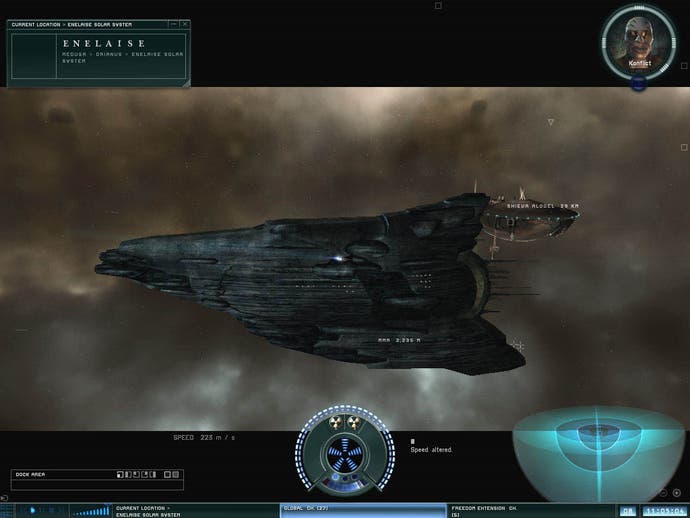
Rather than jealously wanting to get his hands on the flight controls, the junior crew member was happy to immerse himself in the intensely co-operative experience, where there existed "an endless universe of possibilities and adventure behind the wireframes". In those quiet 'mass-locked' moments during trade runs, or watching his cousin attempt a notoriously tricky docking manoeuvre, he would fantasise about a multiplayer Elite-style game, one where all his friends - among them future CCP co-conspirator Reynir Hardarsson - could fly their own ships simultaneously. Such was the pace of change that Elite seemed to hasten, Beck didn't expect to have to wait too long for his dream game to appear, let alone be the one to help tease it into existence.
""I felt entitled to more power than I was willing to bear responsibility for."
Over the next 10 years Beck progressed from 8-bit to 16-bit and beyond, from adolescent to adult, learning English as a means to play early graphical adventures and eventually attempting the first MUDs while studying at university. Cousin Benni had put aside the Elite flight controls and was training to be a real pilot, while Beck's ambitions remained a little more grounded, albeit in science-fiction. While establishing a software training business, just down the road his old friend Hardarsson was thriving at a local tech start-up called Oz Interactive, which had just released in beta form Oz Virtual, essentially a nascent MMOG minus requisite gameplay and inspired in part by Neal Stephenson's Snow Crash metaverse.
To Beck, Oz seemed oddly oblivious of just what it had created: "Oz was doing incredible things, getting foreign investment and training up a team of experts in delivering real-time interactive graphics over the internet through a central server to a bunch of users. You had the architects of an MMO right there!"
Beck recalled his fleeting MUD experiences and adolescent Elite fantasies. "It looked so simple," he says, "to join the parts somebody else had already figured out how to make." Before long Beck had sold his fledgling company and set up anew as Loki Margmidlun, later to become Fenris before settling on Crowd Control Productions in 1999. Once the administrative foundations for the new company were laid down, Hardarsson and others transferred from Oz over the coming months and years, among them Torfi Frans Olafsson and Hilmar Petursson, CCP's current creative director and CEO respectively.
Immediately there were two problems the tiny development team faced. One was in convincing itself what was possible given nothing like Eve had been attempted before, let alone in Iceland. The other was in securing the necessary finance to see the project through. There was no other MMO on the market on which to base CCP's now joint vision, certainly nothing that Beck or the team had been aware of. Consequently it proved difficult to convince potential investors of the vision for the game, for whilst multiplayer gaming was established and popular via the likes of Doom and Quake, it was always on the back of a single-player experience and never to the scale that required a prohibitively expensive server infrastructure.

Thankfully, within months of CCP springing into existence, Origin and EA released Richard Garriott's Ultima Online. For Beck, fearing they had been beaten to the market, it seemed like the end of the journey before it had managed to get going, but quickly he realised the latest Ultima was less a threat and instead a validation of what they were attempting to create. "It was a reassuring proof of concept," he says. "Certainly it was a very free and unrestrained game compared to everything that followed."
Despite the income from a board game released in 1998 and capital from investors the following year, Beck began to suffer from what he euphemistically calls a "complicated relationship" with his colleagues. He was CCP's majority owner, founder, manager, chairman and sole game designer, roles he found increasingly hard to set aside as the team expanded and the game began to take shape to his exacting specifications.
"I put incredible pressures on myself and became intolerable to work with," he says. "I had moments of being the crazy guy in the studio trying to work on the impossible masterpiece, seeing doom and failure and how far Eve was from the ideal." This self-doubt, combined with a need to control every aspect of business and development, became a destructive combination. "I felt entitled to more power than I was willing to bear responsibility for. I wanted someone else to wear the suit without relinquishing the power and that's impossible to do. It was difficult for me to be vetoed on anything." Was he a dictator? "However unflattering that description is and as much as I would wish to describe myself in other ways, I think that's probably the most truthful. Correctly or not, I always felt vindicated by the mission."
In 2002, soon after CCP had at long last secured a publishing deal for Eve Online and the game officially and optimistically reached beta, matters came to a head and Beck was fired. He doesn't recall exactly why, only that he was "acting like a lunatic", throwing tantrums and threatening to fire anyone and everyone around him. "It was like the end of a marriage. There were tears and shouting and emotions flaring, but I didn't have the maturity to face the challenges that came with the job - that's the core of it."
Beck's divorce from CCP was a necessarily long and complicated one on account of his majority 20 per cent stake in the company, a stake he was happy to be rid of quickly in spite of what would be a poor return. Likewise he was quick to leave Reykjavik behind: being a city where everyone seems to know everyone else and their business, Beck found it almost impossible to avoid old colleagues and mutual friends.
Beck retreated to the Mediterranean and spent "the most boring holiday of my life" driving around Spain in a red Mercedes. When he returned to Reykjavik, it was to quietly resume paid employment. When Eve Online finally launched in May 2003, its chief architect was quietly pacing the wards of the Kleppur Mental Hospital. "It's not like I wanted to be seen in public," he chuckles.
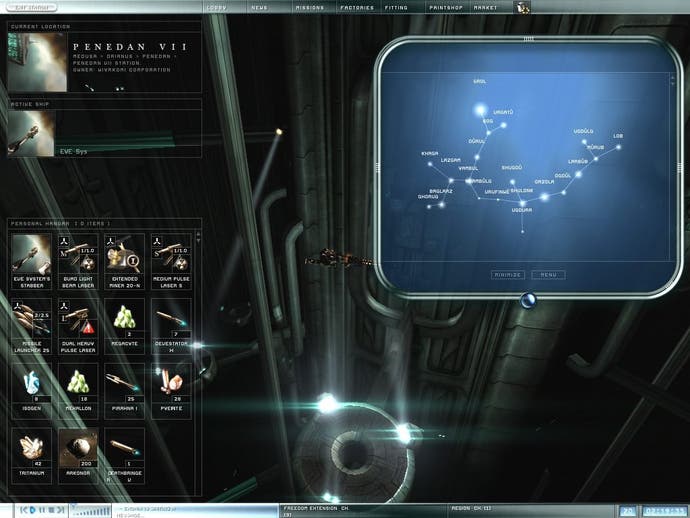
Both Beck and the company he established and steered for five years have taken some intriguing twists and turns over the past decade. While CCP was setting up studios across the world to facilitate the development of World of Darkness and Dust 514, Beck was similarly colonising various corners of the globe, promoting and producing live shows in the name of LazyTown, to which an estimated million people attended. But he opted to leave the executive life behind to return to game development, founding a new studio, Narc, in 2007 to begin design work on a new MMO, one that he's been wanting to create since his asshole years at CCP; a game, he suggests, might have been CCP's second had he been able to continue.
Of CCP's output since he left, Beck isn't overly impressed. Eve's near-disastrous 2011 Incarna expansion he calls a "horrible deformity - a crazy idea from the start". In-development VR space shooter Valkyrie is "gimmicky" and Dust 514 "about as far from being a logical addition to Eve as can be imagined." With only the merest hint of bitterness he adds: "I'm sure it's dying quietly, or I hope so."
"Hilmar is a brilliant executive and programmer. I guess he was the better man."
As for World of Darkness and its recent cancellation, Beck says he wasn't surprised to hear that CCP had pulled the plug after eight years of production. "It must be one of the biggest write-offs in history," he says. "It's frustrating to see the proceeds of Eve squandered so fruitlessly, but I'm also sad on Reynir [Hardarsson]'s behalf, and for everyone that poured their soul into it, month after month and year after year. I just felt it was incredibly ambitious, to simulate a modern, real-life cityscape. For me it's an impossible environment for an MMO. If there's a lesson from Elite, it's don't fill up your polygons if you don't have the hardware to support it. Keep it wireframe and let the imagination fill it and you'll get a more beautiful picture. Design it so technology is never the boundary."
While Beck mentions karma in relation to some of CCP's decisions since his departure, there's no obvious evidence of ill will towards the company or any of those who might have been prominent in having him removed.
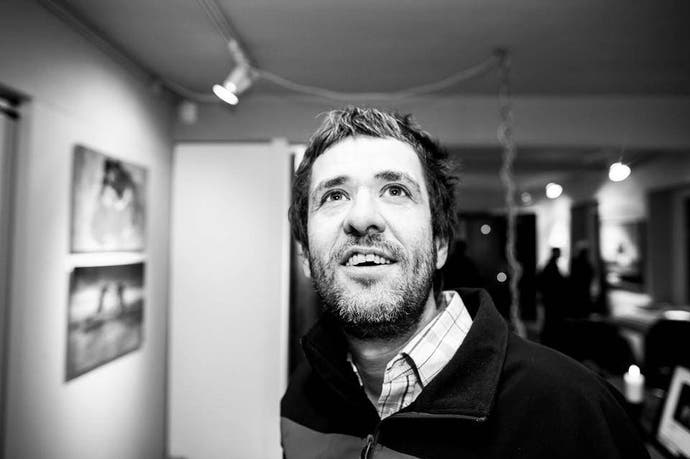
"Hilmar is a brilliant executive and programmer," he says of CCP's long-serving CEO. "I guess he was the better man. He took over a ship that I thought I would steer, that's all. It's like James Hunt vs Niki Lauda - it's all ancient history." Except of course it's a history from which Beck remains largely absent. "It's not a pissing contest," he says. "I can't say if I would have made anything without Reynir. I can't say if either of us would have survived not getting Hilmar. There are no grudges," he says. "I've always wished Eve and the company well. The core of CCP is a bunch of really, really talented guys. I knew they would deliver, but maybe in my arrogance I thought it was the core design of Eve that has survived, even [against] the onslaught of CCP at times."
Whatever the rights or wrongs of his dismissal, or however many course corrections CCP have had to make, Beck appears to have long since moved on, confident once again in his abilities to head up the development of an MMOG that he believes the world needs and that he can deliver. Again, as with Eve, it's a game he's spent a decade fantasising about and is poised to take to the next stage. It won't be from Iceland though, where there remain too many uncomfortable reminders. Instead Narc and its founder/manager/game designer will move abroad - perhaps to the UK or Malta - and start the process of hiring staff.
Yet an obvious question remains. Will Beck's second game, inspired in parts by Eve and the classic sci-fi movie Westworld (and going by the working title Beyond Ever After), end up being headed up by someone else? Has Thorolfur Beck learned not to be the dictatorial asshole? "That's the million dollar question," he smiles.
"I read somewhere that true humility is not denying your talents - that's just another form or arrogance - but it's to be able to enjoy a beautiful work whether it's your creation or somebody else's. I guess the more I'm able to remove my ego from the equation, the better the work will be. [With Eve] there were certain either tough or complicated things that came with the territory that I somehow felt entitled to skip which I've come to realise that I can't. The question of relinquishing control has got a lot to do with self-confidence and a deep sense of knowing who you are and what your strengths and limitations are. I think those things can be managed."
